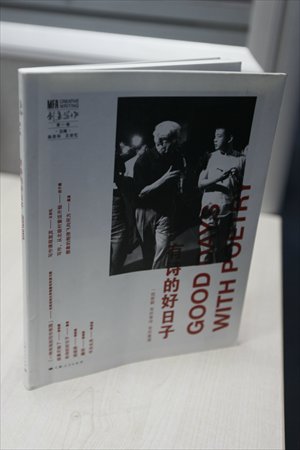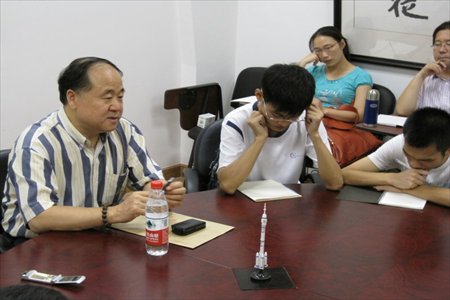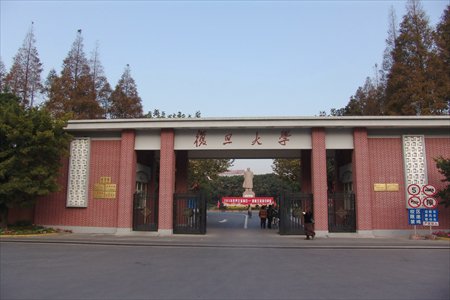Writers’ Dreams Certified
Whether creativity comes from skill and knowledge or divine intervention is an old debate that dates back to the era of Plato. And dispute over the legitimacy of creative writing as an academic discipline has never really stopped since it was first introduced at the University of Iowa in 1922.
Although creative writing has been a popular choice of major around the world for years, no such fine arts degree course existed in the infamously uncreative Chinese education system until three years ago, when an experimental Master's program was launched at Fudan University. This summer, the very first graduates from the course have just published their works in a book collection titled Good Days with Poetry.

Good Days with Poetry, the collected works of Fudan's creative writing graduates Photo: Cai Xianmin/GT
Pride and prejudice
"Even famous writers lack skill," Wang Hongtu, a writer and a professor in charge of the program, told the Global Times. "It's not uncommon for people to say that they will write a novel after retirement. But why don't you hear people say they will compose a symphony after retirement? Writing seems easy but, as a matter of fact, it also requires a very developed set of skills," Wang said.
The belief that skills are of vital importance and that those skills can be taught is what creative writing as a program of study holds dear to. With Nobel laureates like Saul Bellow (1915-2005) and Joseph Brodsky (1940-1996) as teachers and literary masters like Kazuo Ishiguro (1954- ) and Raymond Carver (1938-1988) as students, over the years, the discipline has built connections to big names and thus cemented its credibility.

Nobel laureate Mo Yan talks to creative writing students at Fudan University. Photo: Courtesy of Wang Hongtu
In the late 1980s, many universities in China introduced majors in writing, but all were later banned by the government. Fudan held unofficial classes for writers without giving a diploma, but the practice survived for only three years from 1989 to 1992.
Things started to change when the acclaimed novelist Wang Anyi came to Fudan to teach in 2005. It took another four years to get the Master of Fine Arts (MFA) in Creative Writing approved by the Ministry of Education.
Wang Hongtu is quick to sound a note of caution, however. "We are not responsible for producing writers. A lot of things can't be taught - idiosyncrasy, passion and so on," he admitted. "Even at the University of East Anglia, where one of the best creative writing classes in the world is held, only 30 percent of graduates get published."

Shanghainese writer Wang Anyi talks to creative writing students at Fudan University. Photo: Courtesy of Wang Hongtu
Portraits of artists as young grads
Charging 70,000 yuan ($11,427) for two years, the tuition for Fudan's Creative Writing MFA is more than twice that of other majors. "It's a little bit expensive but the money can be earned back anyway. I want to do what I really like no matter what," said Wang Kanyu, a student who just finished her first year of the program.
The plan is to enroll 15 students every year, but in the first year only 12 students were admitted. "We don't want students who are not talented even if he or she did well in entrance examinations," Wang Hongtu said.
"I came to write. I had this ambition to write. If you don't write, it's hard to keep doing it," Lu Deng, a poet and one of the first 12 graduates from the program, said. The course's reading list embraces works of all genres and time periods. But what distinguishes the program from traditional academic study is the complete focus on honing students' writing skills, whether it's poetry, prose or drama. No essays are required but one must write a novella of 30,000 words to graduate.
"You can learn writing by yourself, that's true. But here you have the atmosphere, which is very important. You get the opportunity to be criticized and stimulated," Wang Hongtu noted.
"We are all simply honored to study here," Lu said.
Boasting globally renowned Chinese authors like Mo Yan, Yu Hua and Yan Lianke as guest lecturers, Fudan's creative writing program is an impressive attempt to nurture the next generation of Chinese literary talent.

An experimental Master's program in creative writing was launched at Fudan University three years ago. Photo: CFP
On the road
So far, a writer's certification has not led any of the first 12 graduates, whose ages range from 25 to 37 years old, to careers in creative writing. A year after graduating, most of them are now teachers or journalists, as reported on the last pages of Good Days with Poetry.
"Some of us are still loyal to literature but first we have to worry about life. There are some compromises we must make," said Lu, now a teacher at Shanxi University. He thinks it's possible that in five or 10 years' time, some fellow graduates will be "important writers."
"Some of my classmates have huge ambitions in writing. Though I am more a reader than a writer, I will try to get a job related to literature," Wang Kanyu said. "It's simply boring just picturing myself working in some fancy office of some foreign company!"
The future of the graduate students is unpredictable. "A genius will overcome any difficulties anyway," Wang Anyi wrote in the Declaration of Creative Writing, which serves as the preface of the book.
"It's financially unrewarding. But if you keep trying, one day you will get there," Wang Hongtu said. "That's our dream."